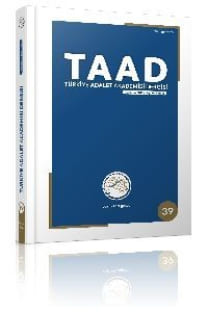EĞİTİM HAK VE ÖZGÜRLÜĞÜNÜN TEMELİ OLARAK TERCİH HAKKI
The Right of Choice: The Foundation of Education Rights and Freedoms
___
- Bull, Geoff; Anstey, Michele. Evolving Pedagogies: Reading and Writing in a Multimodal World, Curriculum Press, Carlton South, 2010.
- Commission of the European Communities. Adult learning: It is never too late to learn, http://eur-lex.europa.eu/LexUriServ/site/en/com/2006/ com2006_0614en01.pdf (20/11/2013).
- Cooper, Bruce S (ed). Homeschooling in Full View: A Reader, Information Age Publishing, Charlotte, 2005.
- Council of Europe. Governance and Quality Education, http://www.coe.int/t/ dg4/education/standingconf/Source/Reference_textes/Final_Declaration_ ConfMin_april13_en.pdf (20/6/2013).
- Cowan, J. Milton. Arabic-English Dictionary: The Hans Wehr Dictionary of Modern Written Arabic, Spoken Language Services, Urbana, 1994.
- Cüceloğlu, Doğan. Özüne Yabancılaşmış İnsanların Oluşturduğu: ‘Mış Gibi’ Yaşamlar, Remzi Kitabevi, İstanbul, 2012.
- Dill, Jeffrey S. The Longings and Limits of Global Citizenship Education: The Moral Pedagogy of Schooling in a Cosmopolitan Age, Routledge, New York, 2013.
- Hase, Stewart; Kenyon, Chris. Self-Determined Learning: Heutagogy in Action, Bloomsbury Publishing, London, 2013.
- Hays, Robert T. The Science of Learning: A Systems Theory Perspective, BrownWalker Press, Florida, 2006.
- İncil.http://kutsal-kitap.net/bible/tr/index.php?mc=5&sc=1043&id=1056 (21/11/2013).
- James, William. Pragmatism: A New Name for Some Old Ways of Thinking, Longman Green and Co, New York, 1907.
- Lind, George; Sandberger, Johann-Ulrich; Bargel, Tino “Moral Competence and Democratic Personality” in Lind, George; Hartmann, Hans. A; Wakenhut, Roland (ed.) Moral Judgments and Social Education, Transaction Press, New Jersey, 2010.
- Livingston, Jennifer A. Metacognition: An Overview, http://gse.buffalo.edu/ fas/shuell/CEP564/Metacog.htm (20/11/2013).
- Long, Edward LeRoy. Higher Education as a Moral Enterprise, Georgetown University Press, Washington DC, 1992.
- Menski, Werner. Comparative Law in a Global Context: The Legal Systems of Asia and Africa, Cambridge University Press, Cambridge, 2006.
- Milli Eğitim Bakanlığı. Millî Eğitim Bakanlığının Kısa Tarihçesi, http://www. meb.gov.tr/meb/tarihce.html (19/6/2013).
- Online Etymology Dictionary. http://www.etymonline.com/ (20/6/2013).
- Shachtman, Tom. Rumspringa: To Be or Not to Be Amish, North Point Press, New York, 2006.
- Tevrat. http://www.yolgosterici.com/tevrat/tevrat01.htm (20/6/2013).
- Türk Dil Kurumu. Büyük Türkçe Sözlük, http://tdkterim.gov.tr/bts/ (27/6/2013).
- Türkiye Barolar Birliği. Hukuk Öğretimi ve Hukukçunun Eğitimi: Uluslararası Toplantı, 9-11 Ocak 2003, TBB Yayınları, Ankara, 2004.
- Ünlü, Sezen. Sosyal Psikoloji, Anadolu Üniversitesi, Eskişehir, 2010.
- Wikipedia. http://de.wikipedia.org/wiki/Bildung (20/6/2013).
- ISSN: 1309-6826
- Yayın Aralığı: 4
- Başlangıç: 2010
- Yayıncı: Türkiye Adalet Akademisi
6100 SAYILI HUKUK MUHAKEMELERİ KANUNUNA GÖRE DELİL İBRAZ VE İKAMESİ
TÜRK BORÇLAR KANUNU ÇERÇEVESİNDE BORCA AYKIRILIKTAN DOĞAN KUSURSUZ SORUMLULUĞA GENEL BAKIŞ
İDARİ MERCİ TECAVÜZÜ VE DÖRT GRİ ALAN
ANAYASA MAHKEMESİNİN BİREYSEL BAŞVURU KAPSAMINDAKİ KARARLARI IŞIĞINDA TUTUKLAMADA GEREKÇE
CİNSEL İSTİSMARLARI AÇIKLAYAN TEORİLERİN SUÇ SORUŞTURMALARI BAĞLAMINDA İRDELENMESİ
Fatma BEYAZTAŞ, Gökhan ORAL, M. Burak GÖNÜLTAŞ
ÖZEL BİR ADLİ YARDIMLAŞMA TÜRÜ OLARAK ORTAK SORUŞTURMA EKİPLERİ OLUŞTURULMASI
POSTMODERN JEOPOLİTİK VE KÜRESEL TASARININ ELEŞTİREL ÇÖZÜMLEMESİ
Protection of Human Rights by International Court of Justice
